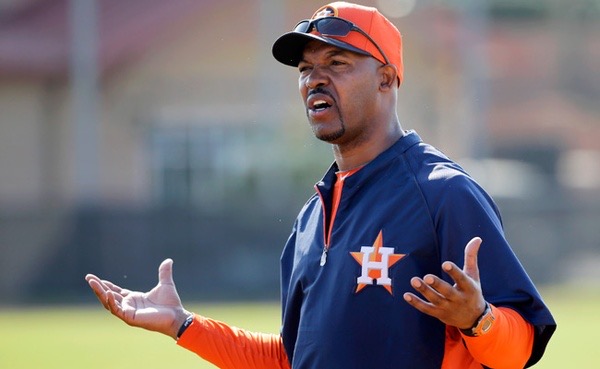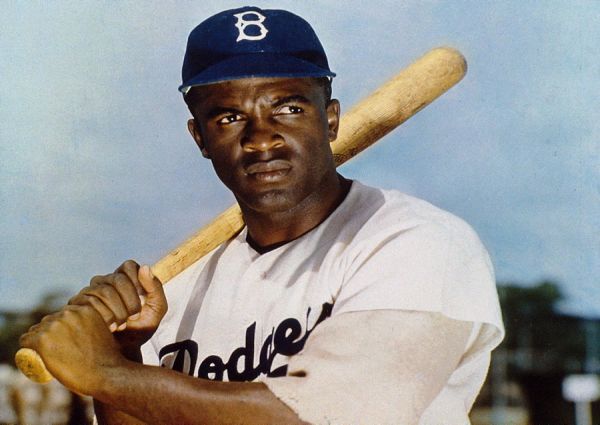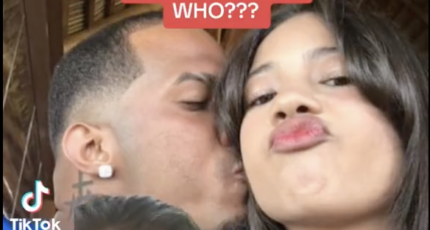The Birth Of The Shadow League
The Shadow League name was masterminded in the spirit of the Negro Leagues, recognizing the racially-oppressed, supremely talented, charismatic, undervalued, and driven players that were forced to exist in the shadows of all-white MLB.

It was this underdog concept that inspired TSL founder and CEO Keith Clinkscales to name his cutting-edge digital sports, culture and entertainment site “The Shadow League.”
A league of writers and creators who were talented enough to thrive in mainstream journalism, but instead exist as outliers – the true voice of the people — wielding a furious pen and speaking truth in those places that breed uncomfortability in the everyday man or woman.
Underappreciated heroes on the frontline in the battle against racism and oppression. Products of a movement born when the dark dagger of bigotry pierced through the heart of Black baseball, causing an explosion of talent and production that has stood the test of time and opened the doors of opportunity for others.
MLB Acknowledges Negro League Stats
On Wednesday, Commissioner Rob Manfred announced that the MLB is officially elevating the Negro Leagues to Major League status.
The move acknowledges the Negroe Leagues as (separate) but equal. Manfred described the maneuver as “correcting a longtime oversight in the game’s history.” Going forward, MLB will recognize the “statistics and records” of approximately 3,400 players who balled out in the seven leagues between 1920-48.
The Leagues were rich with all-time great diamond-miners like Josh Gibson, Monte Irvin, Cool Papa Bell and pitching phenom Satchel Paige.
READ MORE: Negro League Legends: Oscar Charleston

Via MLB’s press release:
“…MLB credits all of the baseball research community for discovering additional facts, statistics, and context that exceed the criteria used by the Special Committee on Baseball Records in 1969 to identify six “Major Leagues” since 1876. It is MLB’s view that the Committee’s 1969 omission of the Negro Leagues from consideration was clearly an error that demands today’s designation.”
Is Negro League Recognition A Funeral Or The Future
“All of us who love baseball have long known that the Negro Leagues produced many of our game’s best players, innovations and triumphs against a backdrop of injustice,” Manfred said in a statement. “We are now grateful to count the players of the Negro Leagues where they belong: as Major Leaguers within the official historical record.”
MLB’s press release names the following leagues as those being elevated: the Negro National League (I) (1920–1931); the Eastern Colored League (1923–1928); the American Negro League (1929); the East-West League (1932); the Negro Southern League (1932); the Negro National League (II) (1933–1948); and the Negro American League (1937–1948).
It’s a respectable gesture by baseball, but purely symbolic and rather confusing when you consider how baseball’s had a cultural disconnect with young African-Americans for some time. And the MLB is rooted in a belief that Negro League players were inferior.
https://twitter.com/hbryant42/status/1339963777152917504
It’s hard to dispute that the sentiments towards brothers haven’t changed much. The number of Blacks in the entire MLB sits at just under 8 percent and there are only two Black managers. Despite its rich history of Black baseball kings, the popularity of the sport has diminished among young, inner-city athletes.
READ MORE: Our Game 2: Where Are All The African-American Baseball Players?
Black players weren’t wanted in baseball, even after Jackie Robinson shattered the racial barrier in 1947. The owners’ greed and desire to win is what facilitated Black participation in MLB. Branch Rickey seemed like a solid dude, but we know he wanted to integrate the game so that Black players such as Jackie Robinson, Roy Campanella and Don Newcombe would help him dominate the National League.
For Jackie Robinson Day, here’s an image from the Archives that features Robinson, Lyle Suter (whose illustration they’re admiring), Charles Pratt (grandson of the founder of Pratt Institute and the school’s president), and Branch Rickey (then-president of the Brooklyn Dodgers) pic.twitter.com/Jad95kSVMi
— Pratt Institute Libraries (@PrattLibraries) April 15, 2019
It took the white players and fans a bit longer to adjust because their bottom line wasn’t affected by keeping the game segregated. In addition, the country was a boiling kettle of racial unrest.
Sometimes it still feels that way now. Baseball doesn’t want to embrace its true history and accept the fact that the game is not as entertaining, exciting, marketable or miraculous without Black participation.
READ MORE: Negro Leaguer Jim Robinson, Toyota & MLB Celebrate 100 Years of Black Baseball
Former MLB player Adam Jones, who was called the N-word and had peanuts thrown at him while playing the outfield for the Baltimore Orioles in Boston’s Fenway Park, said straight up that baseball is a “white man’s game.”
On Thursday, distinguished LA sportswriter Bill Plaschke straight up said, “Baseball is still very, very racist…has racism running through it.”
Combine statements like that with the evolving culture and metrics in baseball that discredits “Black” baseball skills, and a lack of diversity of race, thoughts and ideas in MLB front offices — and it’s no wonder why baseball gets no love in the Black community.
MLB’s Diversity Programs Move The Needle On Field
Baseball’s diversity programs aimed at identifying developing and inspiring the next generation of minority baseball stars have seen some success in the past five years as nearly 20 percent of all MLB first-round draft picks have been African-American.
And most of them have participated in at least one of MLB and USA Baseball’s diversity youth programs, whether it be the Hank Aaron Invitational, Dream Series, RBI Program or Breakthrough Series.
Events like the Hank Aaron Invitational offer a safe haven to just focus on the game. https://t.co/nNyci4na3A 🙏 pic.twitter.com/iyKjgsUyZ1
— MLBDevelops (@MLBDevelops) August 1, 2019
Unfortunately, the coronavirus pandemic has set the goals of the program back a bit just as it was gaining tremendous momentum with a host of huge events getting canceled dating back to last summer. These multi-day events usually attract college coaches and major league scouts to evaluate fresh, young, often undiscovered Black talent.
Owners Still Usurping The Soul In The Hole
Regardless of how successful MLB’s youth development team is in diversifying the game on the field, the true disconnect, as usual, is with the owners. That’s why the diversity success baseball is seeing at the grassroots level and on the field isn’t translating to the front office and other leadership positions.
Nothing will change as long as MLB ownership remains an exclusive group of white people who prefer not to engage or acknowledge any social issues that might affect their team’s Black players.
On January 31st, 2019 we celebrated what would have been Jackie Robinson’s 100th birthday. And that February, we lost Frank Robinson, the man that became MLB’s first black manager in 1975.
READ MORE: 5 Defining Moments In The Life Of Frank Robinson
When you think about what those two pioneers did for African-Americans and the game of baseball, and then consider the state of the game now, it makes you wonder what happened to all of the progress that baseball and the MLB love to promote, despite it being a false narrative.
Back when the world was protesting the death of George Floyd and social justice change seemed to be taking place overnight, MLB joined the parade and promised diversity in their front-office hirings but the end results were much of the same.
With the exception of Kim Ng who became the first woman and first person of East Asian descent to be the GM of an MLB franchise with the Miami Marlins, no other minorities were hired to fill any of the eight presidents of baseball operations and GM jobs filled this winter. Qualified Blacks were once again shut out of opportunities to acquire a leadership position.
READ MORE: Kim Ng Hire Puts A Bow On 2020, A Watershed Year For Women In Baseball
The support of Black Lives Matter by the players and the league, the kneeling, the emotional press conferences and inspirational videos in support of racial injustice and against systemic racism, didn’t amount to much when it came time to institute real systemic change.
In this together. pic.twitter.com/pNizLNdHOG
— Los Angeles Dodgers (@Dodgers) July 16, 2020
The Whitewashing Of Baseball
According to USA Today’s legendary MLB writer Bob Nightengale, “The New York Mets hired two white men in Sandy Alderson and Jared Porter to become their president and GM. The Philadelphia Phillies hired Dave Dombrowski, to become their president of baseball operations. He’s white. There were new white GMs in Texas (Chris Young) and Anaheim (Perry Minasian). There were three white men promoted to president or GM with the Chicago Cubs (Jed Hoyer), Cincinnati Reds (Nick Krall) and Milwaukee Brewers (Matt Arnold).”
Just for good measure, Detroit unfathomably hired former Astros manager AJ Hinch just one season after he was suspended for his participation in the explosive cheating scandal that unscrupulously won Houston the 2017 World Series.
READ MORE: Old School Rules: Dusty Baker Hired To Solve Problems In Houston
According to Nightengale, while Black executives were job candidates, not a single one was promoted into a high-ranking leadership role.
Mike Hill, former president of operations for Miami with a degree from Harvard, interviewed for the Mets and Phillies. Billy Owens, assistant general manager/director of player personnel for the Oakland A’s, interviewed with the Mets and Angels.
And De Jon Watson, Washington Nationals special assistant who has been an assistant GM, scouting director, farm director, and a two-time World Series champion, didn’t even get a single damn interview.
It’s inexcusable. Baseball doesn’t have to look far. There’s an alumnus of African-American players and coaches available.
Men like former Astros manager Bo Porter, who are fonts of all knowledge when it comes to baseball, but are constantly overlooked for no good reason. Porter built the foundation of that championship Astros team and never got to see his efforts come to fruition.

READ MORE: MLB’s Black Manager Crisis: What About Bo Porter?
Porter has over 28 years of MLB experience as a player, coach, manager, front office executive, and TV personality. He is currently an on-air Baseball Analyst for MASN’s Washington Nationals “Nats Xtra” Pre and Post Game Show and constantly expanding his brand and capitalizing on his knowledge as one of a handful of African-American managers in MLB history.
Teams should be clamoring for a 48-year-old Black baseball savant, especially during these times.
Jokes On Us
“ I had fooled myself into feeling that by seeing people march on the streets on our behalf, and that all people matter,” Chicago White Sox executive president Ken Williams told USA TODAY Sports, “there was going to be some change. I really thought that. I won’t make that mistake again”
Kenny Williams is the lone ranger in MLB. At 56, he’s the only African-American heading baseball operations for an MLB franchise. He secured the White Sox GM gig 20 years ago and 2022 will be his 40th year in the game.
https://www.youtube.com/watch?v=xiJisO7F8Qk
“It hurts, man, it (expletive) hurts,’’ an emotional Williams told USA Today. “It hurts to see guys achieve things in this game, and it hurts to see these guys are so damn good at what they do, and they continue to get bypassed over and over again. It physically hurts.
I can’t stand in front of some of the young aspiring executives in the game and tell them with a straight face and tell them they have opportunity for advancement. It would be completely insincere for me to do such a thing…I know some people don’t want to hear what I have to say, but I’m just being honest with you.”
During Williams’ two-decade run as a Black baseball exec, there have been only two other General Managers hired; Tony Reagins was Los Angeles Angels GM from 2000-200, Black Ace Dave Stewart Arizona Diamondbacks GM for a brief stint Mike Hill is a former GM of the Miami Marlins.
READ MORE: Tony Reagins Is Spearheading The Black Baseball Explosion
Marlins CEO Derek Jeter brought in Ng to much fanfare, but let Hill go back in October after 19-seasons with the franchise. Hill was president of baseball operations for the past six years.
Al Avila (Detroit Tigers), Farhan Zaidi (San Francisco Giants) and Ng are the only active minority GMs. It’s a sad state of affairs in baseball who is telling the Black community one thing, but showing it another.
Legendary sportswriter Howard Bryant presented a summation of George Floyd’s effect on MLB and how the sport, while celebrating the 100th anniversary of the Negroe Leagues, officially recognizing its players and the social unrest in society, still struggles internally with its place in the new socially conscious sports landscape.
As industries scrambled and Americans took to the streets, it took Floyd’s death for baseball to finally conclude that the sport would not collapse if the game of Jackie Robinson, the sport that presents a citizenship award named after Roberto Clemente, showed some support for the Black communities that have reached a breaking point. Indeed, the sport might actually be credited for showing, at long last, some humanity. Baseball has treated social unrest as if it were kryptonite for the past half-century, yet it supported a call to action. General managers and managers encouraged players to express themselves about the state of the country. The Mets signed the exiled Bruce Maxwell. Reluctant Black veteran players and the refreshing newcomers, such as Cardinals pitcher Jack Flaherty, recognized it was time, at long last, to get out of the dugout. During Opening Day ceremonies honoring Floyd and other Black victims of police violence, the Black players showed their faces. It had been a very long time.
MLB Is At A Racial Crossroads
Baseball continues to push the pomp and circumstance without committing to real change. Tremendously qualified Black baseball minds do exist and would love the opportunity to run baseball operations or put together a championship club.
Baseball doesn’t even have a pipeline of potential minority hires. It’s like MLB doesn’t trust its own self in these matters so it would prefer to stay silent and maintain the status quo while the world is moving and shaking and progressing around it.
MLB just has to make it a priority as it has its minority programs at the youth level. Until we see real institutional change, glorious moments like celebrating 100 years of Negroe Leagues, Jackie Robinson Day and MLB elevating Negro League stats to Major League status, will be looked upon as window dressing for a deeper problem in the game.



